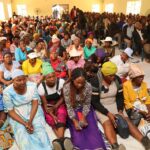THE Zimbabwe Electoral Commission (ZEC) has officially gazetted the re-election of President Mnangagwa for a second five-year term following his victory in last week’s harmonised elections.
An extraordinary gazette published yesterday also proclaimed names of those who have secured seats in both houses of Parliament and in local authorities.
The gazetting of the names follows the verification of results by ZEC and the subsequent declaration by the electoral body’s chairperson Justice Priscilla Chigumba of President Mnangagwa as the duly elected winner of the Presidential poll.
For the second consecutive presidential election, President Mnangagwa of Zanu PF beat his closest challenger, Mr Nelson Chamisa of the CCC party.
“It is hereby notified, in terms of section 110(3) (j) of the Electoral Act [Chapter 2:13], that Mnangagwa Emmerson Dambudzo of ZANU (PF) Party has, with effect from August 26, 2023, been duly elected as the President of the Republic of Zimbabwe,” said Justice Chigumba.
In the same gazette, ZEC chief eections officer Mr Utloile Silaigwana announced that Ms Annah Shiri and Ishumael Zhou were elected Senators to represent Persons with Disabilities with effect from Saturday.
Chief Mtshane Khumalo and Chief Fortune Charumbira, who were elected president and deputy president of the Council of Chiefs, are members of the Senate in terms of section 120(1)(c) of the Constitution, according to the gazette.
Zanu PF holds 62,9 percent of the membership of the National Assembly, with a good chance of raising this to 63,2 percent if it wins Gutu West, as is likely considering how neighbouring constituencies voted.
After winning 136 of the 210 constituencies, Zanu PF won 33 of the 60 proportional representation women’s seats and seven of the 10 youth seats. This means that the ruling party has 176 seats while the CCC has 103 in the National Assembly.
CCC won 73 constituency seats and then picked up 27 of the women’s seats and three youth seats. However, Gutu West still has to run its constituency election, with that poll deferred after a candidate died.
There are no minor party members of the National Assembly and no independents, with all members now belonging to one of the two major parties.
Among the 60 senators elected by proportional representation Zanu PF won 33 to 27, the same ratio as for the proportional representation women’s seats.
The final Senate thus consists of 33 Zanu PF, 27 CCC, two senators representing people living with disabilities and 18 senator chiefs who are all independents, but who tend to vote with the popular elected majority of senators so long as their views are taken in account and critical traditional values are not at stake.
The split of 33-27 in favour of Zanu PF for the proportional representation seats in the National Assembly and Senate reflects the popular vote, although with each province having 10 of each regardless of population it is not quite as perfect as the Presidential vote where all votes are equal.
But in percentage terms the split of 55 percent to 45 percent in favour of Zanu PF follows very closely the 52,6 percent to 44 percent in the Presidential poll.
Both parties gained a little since the independents and minor parties were eliminated, but in the Presidential poll they won 3,4 percent.
In the provincial council elections, where there are 10 seats in each provincial council.
Zanu PF won seven of the councils, including a 10-0 whitewash in Bulawayo Metropolitan where the CCC failed to nominate any candidates. CCC won one council, Harare Metropolitan, while two councils Matabeleland North and South split 5-5.
Both parties now have Parliamentary representation in both the National Assembly and the Senate from all 10 provinces.
Zanu PF won one of the women’s seats in Bulawayo, and one senator, where the CCC won all constituencies, and CCC won a woman’s seat and a senator in Mashonaland Central where Zanu PF had a whitewash in the constituency seats.
Meanwhile, the CCC leader Nelson Chamisa is facing an uphill task in his efforts to dispute the results of Zimbabwe’s recent general election, which saw President Emmerson Mnangagwa declared the winner.
Chamisa and the CCC have cried foul over the election process and results, citing flaws and lack of transparency. They have raised doubts over the credibility and independence of the Zimbabwe Electoral Commission.
The party is considering legal challenges in court and has appealed to the Southern African Development Community (SADC) and African Union (AU) to call for a new election supervised by independent observers.
However, analysts say Chamisa and the CCC face long odds in successfully nullifying the election outcome through legal challenges or appeals to regional bodies like SADC and the AU.
Professor Stephen Chan of SOAS University of London noted that observer reports alone may not be enough to invalidate an official election outcome. The regional groups typically prefer for domestic legal avenues to be exhausted first before getting involved.
Local analyst Rashweat Mukundu acknowledged the CCC’s position but questioned whether their demands could override Zimbabwe’s constitutional framework for elections overseen by the Zimbabwe Electoral Commission. Even if fresh polls are not ordered, Mukundu said the opposition still needs to defend its gains and push for electoral reforms.
Effie Ncube, another analyst, argued the CCC should pursue all available options to resolve the dispute rather than relying on any single strategy. A multi-faceted approach using both national and international avenues may be needed to achieve a satisfactory outcome, he suggested.
Overall, while challenging the results through legal and diplomatic channels, the CCC will face an uphill battle to have its version of events endorsed by regional bodies according to these political observers. Its options may ultimately be limited within Zimbabwe’s existing constitutional framework.
— Herald/MyZimbabwe

Follow @MyZimbabweNews











